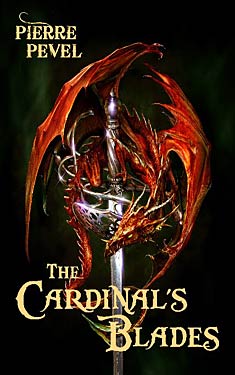The Cardinal’s Blades
 The Cardinal’s Blades
The Cardinal’s Blades
The Cardinal’s Blades: Book 1
Pierre Pevel
Pyr, 2010 (in English)
The Blurb
Welcome to seventeenth-century Paris, where intrigue, duels, and spies are rife and Cardinal Richelieu’s agents may be prevailed upon to risk life and limb in the name of France at a moment’s notice. And with war on the horizon, the defense of the nation has never been more pressing.
Danger is rising from the south–an insidious plot that could end with a huge dragon-shaped shadow falling over France, a shadow cast by dragons quite unlike the pet dragonets that roam the cities like stray cats, or the tame wyverns men ride like horses, high over the Parisian rooftops. These dragons and their descendants are ancient, terrible, and powerful… and their plans contain little room for the lives or freedom of puny humans.
Cardinal Richelieu has nowhere else to turn; Captain La Fargue and his elite group of agents, the Cardinal’s Blades, must turn the tide. They must hold the deadly Black Claw cult at bay, root out traitors to the crown, rescue prisoners, and fulfill their mission for the Cardinal, for their country, but above all for themselves.
It’s death or victory. And the victory has never been less certain.
The Pros
The Cardinal’s Blades is an homage to Alexandre Dumas’ Three Musketeers set in an alternate history France. With many of the same characters, and character types, Blades evokes the same devil-may-care swashbuckling adventure of Dumas’ work. Pevel has enlisted the services of D’Artagnan, Athos, Porthos and Aramis, though his doppelgangers answer to different names, as part of an elite corps of special-forces musketeers. We’re introduced to our heroes in a series of daring-do vignettes that establish their characters and link them to their archetypes. For instance, one of our musketeers, a big burly fellow in his cups, starts a tavern brawl to defend a lady’s honor and you quickly realize this is Pevel’s Porthos. Indeed, each of these establishing scenes rewards you with an "a-ha!" moment that makes you feel instantly at home with the characters. They’re a wink from the author who’s saying to us: "You see where I’m going with this, right?" Indeed we do.
There are other borrowed characters like the eponymous Cardinal Richelieu that are right on the money and a slew of new characters like La Fargue that are worth getting to know. To make things more interesting there are many elements of the fantastic tossed into the mix – namely dragons, dragonets and dragon-men. That’s a lot of dragons to contend with! Then there’s the magic-wielding bad guy spies and assassins and their secret evil cabal of evil – complete with beautiful femme-fatale – to keep things moving.
The Cons
I have two main quibbles with Blades. First, the story suffers from its large ensemble cast. Better than half of the book is spent on set-up for the characters and many of the names are so similar it’s easy to get them confused. The character vignettes, though entertaining and possibly the best passages in the book, don’t move the plot forward. Knowing this is the first of the series makes me a little more forgiving on this point.
My second quibble is the fantasy elements seem to be pasted on as an after-thought: dragonets instead of alley cats, dragon-men where just a bad-ass warrior would do or battle dragons taking up space in the background but not actually doing anything – like the dubious CGI junk in the Star Wars re-issue. I kept wondering when we’d get to see a dragon doing its thing. There is a dragon that gets involved in the story late but again it felt a bit contrived. The dragons and the magic are more a looming threat to France than anything else. I hope they will be more integral to the plot in the next installment.
The Verdict: 7 out of 10
If you’re a Dumas fan, or if you just enjoy a good swashbuckling adventure, you’ll find much to like in this book. It’s a "wouldn’t it be cool if the musketeers had to fight magic and dragons and stuff?" joy ride written with skill and a deft touch by a guy who clearly loves his musketeers. The writing is smooth and easy and the translation never falters. The action is fast and fun even if the story twists a little too much for its own good. This is a solid first book to launch the series and now that the origin stories are all sorted Pevel can dive into the story proper with the next book, The Alchemist in the Shadows, due out at the end of the month from Pyr. I can’t wait.



















 Full Details
Full Details


1 Comment
Seems like a reasonable story though it doesn’t quite seem well written enough (too many characters, not enough dragon until late) for me to try it out. Maybe my required level of quality for fantasy is unfairly higher than for sci-fi and that is my problem. My problem with fantasy is that the magic seems to come in handy at just the most opportune moment. Someone just happens to be able to do X and X is what is called for. Need Y? No problem, that gentlewoman over there is a sorceress who happens to do Y. Am I being unfair? It seems to me that sci-fi is based more in physics and has to operate within the boundaries of the possible. It is easier for an author to introduce a character that has the right magic toolkit than it is to introduce a technology that just happens to solve the situation. You do not have to explain the character’s powers (it’s magic!) but you do have to explain why the technology works. Thanks for the review! I look forward to more.
Sorry, the comment form is closed at this time.